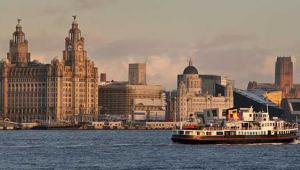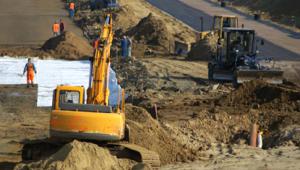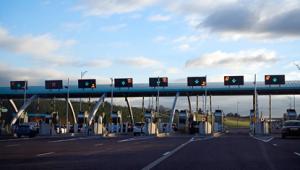Spending on capital investments is to increase by £12bn over the parliament, while the housebuilding budget rises to £2bn per year, expected to deliver 400,000 new homes by 2020. This will be complemented by demand-side measures in the form of help-to buy-schemes and discounts for first-time buyers.
The chancellor described the housing crisis as one of the “great social failures of our age”, noting home ownership rates and more than halved among the under 35s, and said his actions would accelerate progress to “building the infrastructure our country needs”.
This parliament will see the “biggest house building programme by any government” and “the largest road investment programme” since the 1970s, he said.
The 400,000 government-funded new homes will be affordable both to rent and to buy, Osborne said. Almost half of the newbuilds will be ‘starter homes’, sold at 20% below market value for first time buyers. It also confirmed that the Right to Buy scheme currently in place for people renting a council house will be extended to housing association tenants, giving 1.3 million people the opportunity to buy their home.
The limits around Help to Buy schemes will be lifted, meaning anyone in England whose household income is below £80,000, or £90,000 inside London, can buy a home with government help.
Londoners will also benefit from more generous Help to Buy Equity Loans from 2016, with the government offering to loan up to 40% of the price.
Those buying a second home and buy-to-let landlords, however, emerged as less fortunate, with the chancellor announcing an extra 3% in stamp duty on additional properties.
Both the Federation of Master Builders and the British Property Federation applauded the chancellor’s plans to build more homes, but raised some concerns about their delivery.
Brian Berry, FMB chief executive, said, a significant shortage in construction skills could scupper the chancellor’s vision. Housing developments are already starting to stall, Berry said, and a massive uplift in apprenticeships and a greater role for SME housebuilders would be necessary.
Melanie Leech, British Property Federation chief executive, warned against pushing aside the build-to-rent sector and urged the government to invest in “place-making”, ensuring that homes are built in areas with good transport links and social infrastructure such as schools.
Osborne pledged investment in other forms of infrastructure too. Investments in infrastructure are investments in the future, he said, and Britain will be spending much more on it.
Northern Ireland, Wales and Scotland will all see increased funding for capital investments in infrastructure over the next five years, and while the Department for Transports operational budget was cut by 37%, its capital spending is to increase by 50% to £61bn ‒ the “biggest increase in a generation”, the chancellor said.
This will kick off the construction of the High Speed 2 rail and the electrification of the Trans-Pennine, Midland Main Line and the Great Western Line.
London will see £11bn worth of investments in its transport infrastructure and Kent will receive support to relieve the pressure on its motorways caused by Operation Stack, the procedure by which lorries are "stacked" on the M20 when Channel Tunnel and ferry services are disrupted.
Cycling, road maintenance, flood defences and a permanent pothole fund were all earmarked for funding by the chancellor.



















